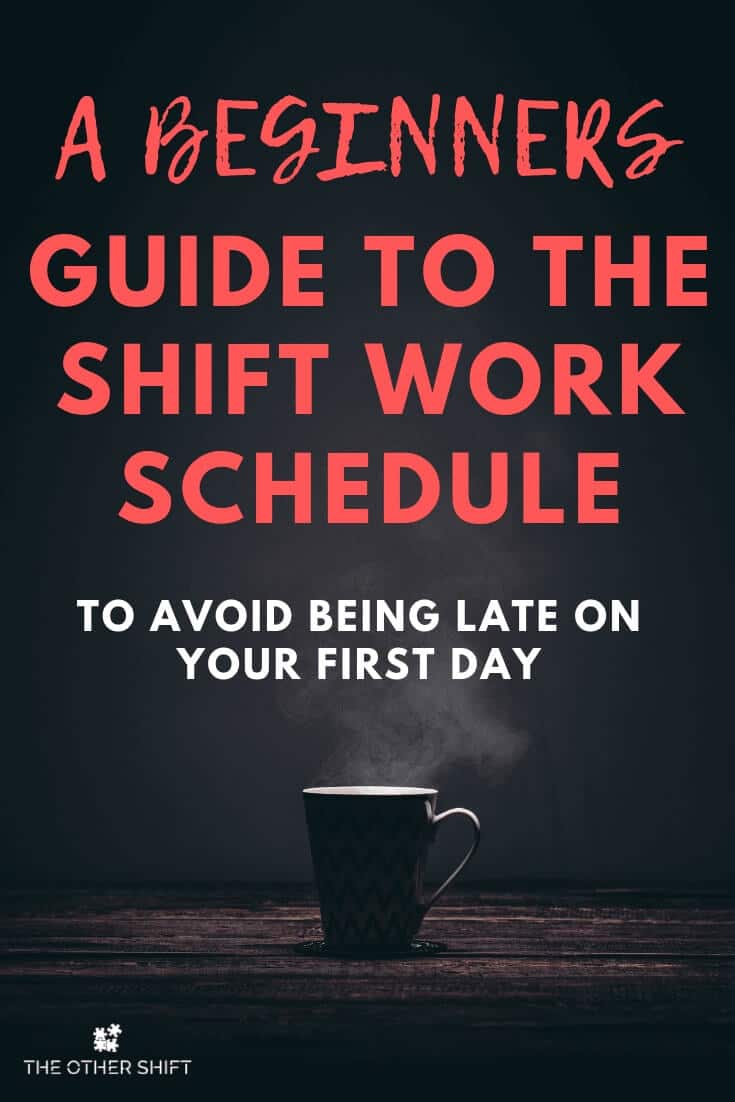Disclosure: This page may contain affiliate links, meaning we receive a commission if you decide to make a purchase through our links, but this is at no additional cost to you. Please read our disclosure and privacy statement for more info.
1st shift, early, AM, swing shift, 2nd, afternoon shift, PM, graveyard shift, 3rd shift, night shift, lobster shift… Are you serious? How is somebody new to the shift working world supposed to understand what this all means? Do they mean the same thing? What makes them different? Let’s clear up the confusion and make some sense of these daunting shift work scheduling terms.
The 1st, 2nd and 3rd shifts are typical rotating shifts. The 1st shift (early, morning, am) traditionally runs from 7am – 3.30pm. The 2nd shift (late, afternoon, pm) starts just before the 1st shift finishes, 2pm and ceases at 10pm. Whereas the 3rd shift (graveyard, night shift) means working overnight from 9pm-7am.
It seems that people got a little too creative when trying to describe the way a typical shift work schedule looks. This post clearly describes the different kinds of shift work, the advantages and disadvantages of each and pro tips to really own your shift work schedule.
What Does the 1st Shift Mean?
This is the “first shift” of the day, generally starting when the sun rises to the mid-afternoon. Most 1st shifts are 8 hours long but can also be 10, 12, 14 or even 24 hours in duration.
I have created three different tables for each of the three shifts to make it easier to understand.
There is, unfortunately, no hard and fast rule or “law” where every shift working environment needs to have exactly the same starting and finishing hours. It’s job and industry dependent.
| 1st shift Hours | Potential Jobs |
|---|---|
| 5am – 9.30am | School bus drvier |
| 5am – 11am | Radio host, morning TV staff, convenience store staff |
| 7am – 3.30pm | Nursing, hospital security, cleaner, phlebotomist |
| 8am – 2pm | Reception, administration, call center support |
| 8am – 4pm | Retail, lifeguard at the local pool |
| 4am – 1pm | Production film companies, baker |
| 6am – 3am | Hospitality (wait staff), security, prison guard, factory worker, laborer, doctor (however often finish around 5pm) |
| 6am – 3pm + Overtime | Truck drivers. You cannot drive for 11 hours straight, however you may be expected to work up to 70 hours over an eight-day period. In most cases, you must not drive for approx. 14 hours before your next job after working a 14-hour shift. |
Other common “street” names for the 1st shift
- Morning Shift
- Early Shift
- AM
- “a”
- Day shift
- Day job
- Day time shift
1st Shift Advantages
- It is the shift that aligns best to your body clock. It is the shift us humans are programmed to both work and sleep, leading to less health complications commonly linked to shift work.
- There is generally more support and specialist help available during your workday if you need assistance.
- The 1st shift meshes well with family life. It is the shift most aligned to the typical 9-5pm workday making it easier to spend time with your family and friends. See – Shift Work and Family. A Practical Guide For Busy Parents
- Never miss an important announcement, impromptu meeting or change occurring within your workplace as last minutes meetings tend to happen in this period.
- The cafeteria is open for business!
- There is less chance of feeling like a zombie on your days off. (Here’s a few hints on what you should do on your days off).
1st Shift Disadvantages
- Busy commute
- Fast-paced (this is a disadvantage if you’re not in the mood)
- Often constant interruptions while trying to complete your work
- A shift can often be short (depending on your industry) which can be awkward with having large sections of time off in the middle of the day
Pro tips while working 1st shift:
- Exercise after your shift regularly. Jumping rope is a great, effective workout if you are short on time.
- Spend quality time with your family after the shift. Limit the use of your device and really enjoy this special time together. Don’t take it for granted.
- Turn on the slow cooker before you leave home to ensure you have a home-cooked meal just waiting for you. Here’s a few delcious receipes to give you some inspiration.
- Limit what you eat when the sun is down. Stick to eating and drinking once the sun has risen as this is favored by your digestive system and body clock.
[VIDEO] – Night Shift Eating Schedules Your Digestive System Will Love
Related Posts:
- Weight loss: How Can I Lose Weight Working 12-Hour Night Shifts?
- Exercise: Impressive Jump Rope Benefits To Get That Killer Body
- Nursing Tips: Being a New Nurse is Hard. How to Stop Feeling Incompetent
- Calendar tips: 10 Best Shift Work Calendar Apps to Stop You Missing Out
What Does the 2nd Shift Mean?
This is generally the “second” shift of the day and ranges from the mid-afternoon till around midnight.
Please explore the table below for more details.
| Hours | Potential Jobs |
|---|---|
| 1pm – 9.30pm | Nursing, gas station staff, state trooper, convenience store staff |
| 5pm – midnight | Hospitality, grocery store staff, prison guard |
| 2.30pm – 6pm | School bus driver, after-school care supervisor |
Other common “street” names for the 2nd shift
- Afternoon
- PM
- Late shift
- Swing shift (see next section)
- “p”
- Dogwatch (4pm – 8pm)
2nd Shift Advantages
- Sleep in, run errands in the morning and see a friend for breakfast
- Great for night owls who like to go to bed late and get up late
- Easy commute, particularly after your shift
2nd Shift Disadvantages
- You’re out of sync with your family and friends. You are often climbing into bed while others are getting out. Or, you’re still at work while your family is having dinner together.
- Higher chance of sleep deprivation than 1st shift due to going to bed sometimes around 2-3am depending on your schedule and job and often being woken early in the morning by your family and traffic etc.
Pro tips while working 2nd shift:
- Use your mornings wisely. Have events booked in and dates scheduled to make you feel accomplished.
- Resist eating fatty foods after midnight on your way home. Bring snacks in the car and make a peppermint tea (which is good for your belly) for your commute home, limiting temptation to stop for take-out.
- Embrace note and letter writing and even personalized video calling. These small acts bring your family together, making you feel like a strong family unit, despite often limited time together.
[VIDEO] – Not sure what to eat late at night? This video will help.
Related Posts:
- Avoid getting sick: How to Work Night Shift, Stay Healthy and Not Get Sick
- Falling to sleep quickly: How to Fall Asleep Quickly Even When You’re Not Tired
- Sore legs? How to Relieve Foot and Leg Pain from Standing All Day
- Intermittent fasting: Should I Eat On Night Shift? Why Intermittent Fasting Works
What Does the 3rd Shift Mean?
Finally, the 3rd shift is traditionally the last shift of the day. It ranges anywhere from dusk until dawn with the shifts varying in duration. Some are 8 hours while others can be 12 +.
Please explore the table below to check out which industries work the 3rd shift.
| Hours | Potential Jobs |
|---|---|
| 9pm – 7am | Nursing, Hotel check-in staff, road construction, security, police, cleaner |
| 11pm – 8am | Nursing, gas station staff, convenience stores |
| 12pm – 6am | Hospitality, prison guard, college dorm staff |
| 9pm – 9am + overtime | Firefighters often work long shifts followed by multiple days off eg. 24 hours on followed by 48 hours off. Doctors are also commonly working 12+ hour shifts depending on their workload and the condition of a patient or situation |
Other common “street” names for the 3rd shift
- Graveyard shift
- Night shift
- 3rd shift
- Overnight shift
- “Nights”
- Midnight shift
- “n”
- Lobster shift
- Anchor watch
3rd Shift Advantages
- Financial incentive
- Easier commute (less cars on the road and fewer people taking public transport)
- Work autonomously and often uninterrupted
- Great for night owls who like to go to bed late and hate getting up early
- Public places are quieter on your days off (bank, grocery store etc)
- If you work a particular number of hours a week or block of time, you may find you work fewer days per week as night shifts are generally longer in duration then day shifts.
3rd Shift Disadvantages
- Limited support if you need to call for help
- Lonely for the “people person” type personalities
- Sleeping during the day can come with some challenges
- It can be difficult to “switch” back to the day time schedule on your days off or on the “weekend”
- Health complications are often associated with the night shift due to increased chances of sleep deprivation and limited sunlight exposure. (source)
Pro tips while working 3rd shift:
- Always bring high protein snacks to work and don’t become reliant on the vending machine
- Exercise between nights and even consider working out immediately after a shift. This video will give you some inspiration on when to exercise.
- Try using the BonoSleep device. We did an honest video review which you can watch here.
- Stay hydrated but stop drinking caffeine 4-5 hours before you intend on sleeping. Stumped with what to drink instead? Here are some delcious alternatives.
- Wear blue light blocking glasses
 2-3 hours before bed and an oversized sleep mask
2-3 hours before bed and an oversized sleep mask and some sound blocking ear plugs
and some sound blocking ear plugs when you’re trying to sleep. Get all three from Swanwick and use code THEOTHERSHIFT to get 10% off all three.
when you’re trying to sleep. Get all three from Swanwick and use code THEOTHERSHIFT to get 10% off all three.
Related Posts:
- Sleep: How Long Should You Sleep Before A Night Shift?
- Relationships: NightsNight Shift Is Killing My Marriage. How to Stop It Happening
- Driving tips: How to Stop Falling Asleep While Driving after Night Shift
- Eating after nights: What Should I Eat After Working Night Shift?
- Exercise on nights: Sleep Or Workout? What Should I Do After Night Shift?
- Night shift jobs: 9 Myths About Night Shift Jobs You Probably Still Believe
- Blue light blocking glasses: Do Night Shift Workers Need Blue Light Blocking Glasses?
Good to Know…
Some businesses like to mix things up, not specifically allocating you to a particular shift. For example, you may work 1st shift on Monday, Tuesday and Wednesday but switch to the 3rd shift on Friday and Saturday.
If you have a new job on the cards, ask about your schedule before you start.
Anti-clockwise rotating shifts are the toughest…
If you are a rotating shift worker, try and request shifts in a “normal” order such as 1st…2nd…3rd shift rather than 3rd…1st…2nd.
What About the Swing Shift?
This is also a very popular shift but it’s a little more unusual in regards to timing than the other three.
So, to make it easier, we created an entire post about the swing shift and how to manage this schedule. It’s titled, “What’s a Swing Shift? 5 Essentials to Managing This Schedule“
If you have the power to control your roster…
It’s best to try and find regularity when you can. Our body clocks love routine so it can predict what and when it should be performing a task. If you can organize to work a few weeks of 1st shift, then switch to 2nd shift for another few weeks, it will work wonders for helping your body clock adjust.
Summary: What Do the Terms 1st, 2nd and 3rd Shift Actually Mean?
In most shift working industries like medicine, aviation, hospitality and emergency services the doors never close. Hence why shift work needs to exist in the first place!
We hope you know have some clarity on what the 1st, 2nd and 3rd shift is all about and how you can succeed in your next shift working job.
Next up, How Do You Work Both Day and Night Shifts? (An Honest Guide)
Cheers,

Disclosure: This page may contain affiliate links, meaning we receive a commission if you decide to make a purchase through our links, but this is at no additional cost to you. Please read our disclosure and privacy statement for more info.





